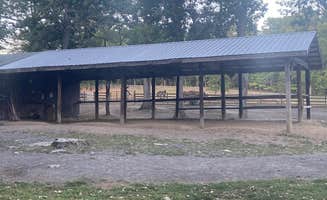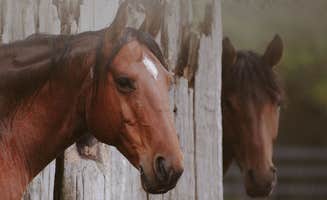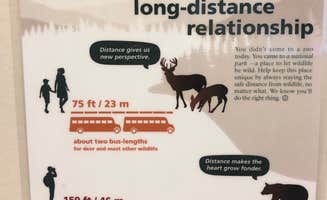Equestrian camping near Berryville, Virginia offers access to mountain trail systems throughout the Blue Ridge region at elevations ranging from 500 to 3,500 feet. The area experiences four distinct seasons with mild spring and fall conditions ideal for trail riding, while summer temperatures typically range from 70-85°F with moderate humidity. Camping options include both dedicated equestrian facilities and multi-use campgrounds where horses are permitted with appropriate containment.
What to do
Trail riding at varying skill levels: Fort Valley Ranch connects directly to multiple trail systems with rides ranging from beginner-friendly 1-2 hour loops to advanced full-day mountain excursions. As one visitor notes, "We found a river access point perfect for swimming and wading... We are planning another visit in the fall" (Jason G., Fort Valley Ranch).
Fishing in stocked ponds: Many campgrounds maintain fishing opportunities for campers with horses. "The kids were able to fish for hours at the two fishing ponds, which both were stocked with bass and bluegill" (Jason G., Fort Valley Ranch). Fishing licenses are required for adults, with day passes available at most local outfitters.
Swimming and water activities: The Cove Campground includes lake access approximately 30 minutes from Berryville. "The beach is large and clean... We really enjoyed it and will go back" (Christopher K., The Cove Campground). Most water areas allow horses to drink from designated access points away from swimming areas.
Multi-use trail exploration: Several properties permit shared use between riders and other recreational users. "Several rustic campsites with a large lake for the kids, and miles of off road trails for atvs, jeeps, and dirtbikes" (Jacob I., The Cove Campground). Trail maps indicating horse-only sections are typically provided at registration.
What campers like
Clean facilities: Despite rural locations, campgrounds maintain sanitary conditions for both humans and horses. At Big Meadows Campground, "Campground is meticulously clean with daily restroom cleaning and trash pick up" (Kim L.), making longer stays more comfortable for riders.
Wildlife viewing opportunities: The region's mixed forest habitat supports diverse wildlife visible from trails. "You will definitely see deer in the campground as they walk through and browse the understory. They are unafraid of humans unless directly approached" (Veronica S., Big Meadows Campground).
Spacious sites: Horse-friendly campgrounds typically provide more space than standard facilities. "The sites are not piled on top of each other. Our site was surrounded by shrubs under the canopy of trees which provided tons of privacy" (Veronica S., Big Meadows Campground).
Seasonal considerations: Fall offers ideal riding weather with reduced bugs and colorful foliage. "And finally, the fireflies are spectacular. At dusk, the ground shimmers, and then after they disperse, you will still see them flit by the tent throughout the night" (Veronica S., Big Meadows Campground).
What you should know
Variable cell service: Communication can be limited at horse camps. At Trout Pond Recreation Area, "there is no cell service. In case of an emergency, you are a 20 minute drive to call for help" (Chris J.). Some facilities have installed emergency phones or maintain staff radios.
Water access considerations: Water systems vary significantly between properties. "There are 4 water spigots in camp 1. However all the travel trailers hooked up, which means you either had to make friends or disconnect their water in order to have access" (Christopher K., The Cove Campground).
Road conditions: Access roads to horse camps can present challenges. "There are some pretty steep inclines to even get to the campgrounds. Unless you have a powerful vehicle pulling your camper, it would help to release your water supply and fill up when you get to the campground" (Chris J., Trout Pond Recreation Area).
Insect management: Bugs can affect both horses and humans depending on season. "The bugs when we got here were kinda crazy. They don't bite but they swarm your head and try to enter every orifice for some reason. A head net was helpful to get the tent and screen room set up" (Veronica S., Big Meadows Campground).
Tips for camping with families
Kid-friendly activities: Properties often provide options beyond riding. At Bull Run Regional Park, "Our family stayed here in a cabin on a long weekend trip to DC... The campground had a climbing wall on one afternoon. There are miles of trails and my gkids enjoyed the nature scavenger hunt. You even get a prize when you finish" (Bridget H.).
Bathroom considerations: Facility quality impacts family comfort. "The best review I can give us of the bathrooms. They're with staying again alone. Locking doors, individual stalls. Hot dog. Best camping showers I've ever had" (Yvonne B., Bull Run Regional Park).
Food storage requirements: Areas with wildlife require proper storage. "Bear box for food storage. Loved seeing the deer so close and other wildlife" (Terri S., Big Meadows Campground). Most equestrian facilities provide horse-proof storage containers as well.
Weather preparation: Mountain elevations can mean temperature fluctuations. "It was an especially cold night hitting a low of 14F. Very happy for the nearby heated restrooms with hot running water" (Carol B., Big Meadows Campground).
Tips from RVers
Electrical capacity: Many horse camping areas have limited amperage. At Graves Mountain Farm Campground, electrical hookups are limited and "the site was a tent site with lots of shade and not too close to others" (Anna R.), requiring self-contained power for longer stays.
Site drainage: Terrain affects water runoff during storms. "While we were here, there was a fairly heavy day of rain. Couple inches, I suppose, but nothing Biblical. The mouths of the metal culverts in our loop were bent downward from campers driving over them, which obstructed the flow. Result was lots of standing water at our campsite" (Stuart O., Bull Run Regional Park).
Leveling requirements: Horse camping areas often have natural terrain. "My site had a slight slope, but was easily overcome using additional blocks on the low side to get the trailer level" (Drew M., Bull Run Regional Park). Bringing extra leveling blocks is recommended.
Noise considerations: Some facilities have unexpected sound sources. "Camp ground is nice... The only drawback is that it is not quite [quiet]. There is a shooting range in the park. It is on a flight path for DCA. And, I66 is not that far away" (Drew M., Bull Run Regional Park).




